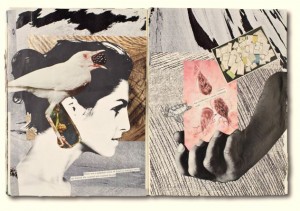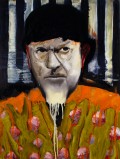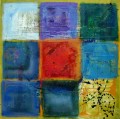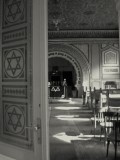Faith and Practice
A Blessing over Progesterone
Every day I say a blessing in Hebrew over my medication: “Blessed are You, O Lord our God, who has kept us, preserved us, and brought us to this time.”
A Rationalist Approach to Suffering
Medieval writings offer important lessons about the nature of loss and its counterpart, healing. Suffering and healing, for the medieval Jewish philosopher, take place in the context of a close interrelationship between the physical and the spiritual, the material and eternal.
The Chosen People? : Two Perspectives
Two Reconstructionist rabbis debate the merits of the view that Jews are God’s ‘Chosen People’ in a multicultural 21st century.
Tzedek and Chesed: Rethinking the Relationship between Advocacy and Service
Through a retelling of the history of Panim, founder Sid Schwarz offers a new take on how to do social justice work.
Why Jewish Environmental Education Matters
When we hear the words “Jewish environmental education,” we often only hear “environmental education” and not “Jewish education.” It’s easy to think of environmental programs as a fun add-on, rather than core, to Jewish learning. That is a mistake.
In the Image: A Jewish Theology to Confront the Bullying Epidemic
We all know the problems of Leviticus 18 for LGBTQ Jews. Here, Margie Klein shows that Talmud provides a Jewish theology against homophobic bullying.
Calling Jewish Activists: Synagogues Need You and You Need Them
Chanukah is the holiday celebrating the rededication of the Temple in Jerusalem. But what about the temples in our own backyards – can they be rededicated, to social justice?
Lepers and Me
I chose to work as a chaplain in part because modern day leper colonies, the homes of those who are most estranged, are the places where God speaks to me the strongest. As a gender-ambiguous transgender person, I identify with them.
What is the Purpose of Jewish Education?
The Jewish education our children receive should manifest itself in Jewishly-grounded ethical action. Interestingly, a very old method of Jewish learning – hevruta – can be a model for how this type of ethical education can proceed.
One Jewish Feminist’s Lifelong Companionship with a Misogynist
It was 1999 and I was a visiting scholar at a synagogue in Florida teaching a workshop on Ezekiel. Midstream, I found myself saying words I had not anticipated saying to these suburban mainstream Jews: “Ezekiel 16, verse 17 is referring to a strap-on dildo and Ezekiel is referencing the emasculation of God by the collective body of Israel who is assuming the phallic, penetrative role in the divine-human relationship.” Gulp.
Speaking of Goddess: Finding the Sacred Feminine in the Song of Songs
The past forty years of Jewish feminist thought and theology have seen powerful analysis and fruitful conversations about the Divine, the feminine, and the power of the language we use to evoke and invoke the Holy in our lives. Yet to speak of Goddess in a Jewish context is still often to speak in a whisper.
Judaism 2030: Visions of a Jewish Tomorrow
This past week, the Jewish Outreach Institute hosted a conference entitled “Judaism 2030: A Working Conference for a Vibrant Jewish Future and the Steps Necessary to Get Us There.”
My Daughter’s Period Party
My second daughter, Meira, got her period for the first time earlier this year, right before her bat mitzvah. With her older sister, Michal, we had initiated a new family ritual of a “period party” – but this time, things were different.
How the Jewish Prayer Service Resembles Pentecostal Worship
Most visitors to a mainstream Jewish prayer service would not typically describe what they witness as “ecstatic.” But the structure of the service has interesting parallels to Evangelical and charismatic services.
God of Contradiction: On Language and Liturgy
The time has come to stop thinking about language and God, lest we become so tangled up in our metaphors that they become our experience of God entirely.
(Re) Reading Radicalism: Reading Reviews of Arthur Green’s Radical Judaism
AuthorsIn Radical Judaism, Green has finally “come out” and made his case for a full-blown post-monotheistic Judaism. Radical Judaism is nothing less than a call to re-envision the Jewish God and, by extension, Jewish practice and belief.
Sarah and Moses: God’s Teachers of Compassion
Or Rose argues for the continuing power of the rabbinic exegetical tradition in this reflection on R. Shapir (the Piaceszner) and the Holocaust.
New Teachings from Exodus: Berman & Waskow’s Freedom Journeys
Egypt’s revolution should remind us of the Jewish “Passover” revolution there 3000 years ago. Freedom Journeys comes at just the right time.
Hasidism and “Nature”: Negation and Affirmation
Would the early Hasidic masters be environmentalists?
Queer and Practicing: Reclaiming the Lost Spiritual Path of Chutzpah
To find a place for LGBTQ Jews in Judaism, we must regain the chutzpah of our ancestors, the Talmudists who took seriously Deut 30:12, “the Law is not in Heaven”
![[the current issue of ZEEK]](../../../image/2/100/0/5/uploads/leftistethicistgraphic-52842c6a.png)
- 5000 Pages of Zeek
- Founded in 2001, Zeek was the first Jewish online magazine, and we have over 5000 pages online to prove it, all available free of charge. Read more in the Archive.
















